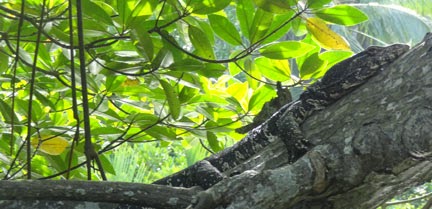Spent a day out along the coast, particularly looking at the sea turtle rescue organizations.
There are quite a few of them, all working to rescue, rehabilitate, and increase the numbers of the sea turtles. I went to one where a young boy, Arum, showed me around...from harvesting the eggs to keeping them in the sand (they're very liquids inside and the shells are very soft and pliable at only a couple of days). They watch the turtles come to shore and when they finish laying, they carefully dig up a nest to bring to a protected area. As the turtles hatch they are kept in large enclosures and then released when they're large enough to hopefully survive the trials of the ocean.
 |
| Arun holding a rather agitated turtle. |
 |
| Tiny little turtle - didn't even cover my palm - about 1 week old |
There are quite a few of them, all working to rescue, rehabilitate, and increase the numbers of the sea turtles. I went to one where a young boy, Arum, showed me around...from harvesting the eggs to keeping them in the sand (they're very liquids inside and the shells are very soft and pliable at only a couple of days). They watch the turtles come to shore and when they finish laying, they carefully dig up a nest to bring to a protected area. As the turtles hatch they are kept in large enclosures and then released when they're large enough to hopefully survive the trials of the ocean.
They also rescue turtles
that have been injured or caught in nets. Once the injury is healed, they are
released. They have a fe turtles that they've kept, mostly because they
couldn't be returned and survive but those turtles are the ones they use to
talk to the school kids about the plight of the sea turtles. Apparently
they are fished for and the eggs harvested for people to eat, threatening the
population.
Took a trip one day down to
the Madu Ganga river, towards Galle. It is a coastal ecosystem of mangroves and
islands and is thought to be one of the few remaining 'pristine' forests in Sri
Lanka. It is against the law to cut the forests...and the people who live there
are quite proud of what they have.
I went early in the morning
and while. Must admit to wondering why I was getting up so early, it was a
great call by the owner of the hotel. I was on the river for two hours
with only one other boat exploring the region. By the end of our time, heading
back for the dock, the river was swamped with tourists in huge boats filled
with people. I loved having it so quiet and peaceful.
 My driver had the eyes of
an eagle. I absolutely did not see the vast majority if the animals before he
pointed them out. While I know he knows what he's looking for, I suspect a few
of the monitor lizards have their favorite haunts so he knows where to look,
however, he did a great job finding things...now if my pictures came out...
My driver had the eyes of
an eagle. I absolutely did not see the vast majority if the animals before he
pointed them out. While I know he knows what he's looking for, I suspect a few
of the monitor lizards have their favorite haunts so he knows where to look,
however, he did a great job finding things...now if my pictures came out... |
| Hindu Shrine |
They had some interesting
building, little stores right on the water, a Hindu shrine on its own tiny
island, a 1000 year old Buddhist temple with a 100 year old book made out of
palm leaves. The writing is in an old language and really tiny! One of
the islands is connected to the mainland with a very long bridge!
Now...this
place is in trouble if the water level rises. The walking and train bridges
that cross the river are not very high. In fact, anything taller than a basic
motor. Oat would not find under it. You are literally scrunched down in the
boat and can feel the bridge woosh above your head as the boat traveled under
it.
 |
| Hand peeling the cinnamon |
I
didn't go back for the nighttime prawn fishing but I did get to see the various
trap systems they have in place. The lanterns they light attract the shellfish
(apparently they don't see too good) and they become trapped, allowing the
fishermen to pull them up. Don't really think watching that would have appealed
to me.






















